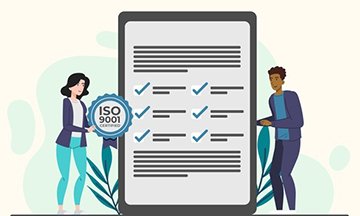Quality Risk Management Training
| Date | Format | Duration | Fees | |
|---|---|---|---|---|
| 15 May - 17 May, 2024 | Live Online | 3 Days | $1750 | Register |
| 30 Jun - 04 Jul, 2024 | Live Online | 5 Days | $2250 | Register |
| 08 Jul - 19 Jul, 2024 | Live Online | 10 Days | $4495 | Register |
| 02 Sep - 06 Sep, 2024 | Live Online | 5 Days | $2250 | Register |
| 06 Nov - 08 Nov, 2024 | Live Online | 3 Days | $1750 | Register |
| 16 Dec - 20 Dec, 2024 | Live Online | 5 Days | $2250 | Register |
Course Overview
What is Quality Risk Management?
Quality risk management is the process that involves understanding and managing the risks that are associated with any business or institution of service. In all organizations and sectors of the nation, there are always risks associated with them. Therefore, having the knowledge and understanding of control or mitigating such risks within an establishment cannot be undermined. Therefore, quality risk management is the systematic procedure of assessing, mitigating, communicating and evaluating the risk associated with pharmaceutical products.
This Zoe Talent Solution training aims to provide the trainee with the complete and standard rules of quality risk management within the medical space. We will empower you with the skills necessary for carrying out swift decisions in terms of your medical field professionally. The quality risk management training is set to enable you to understand risk management standards effectively.
How can you be involved in risk management?
Attendees would be equipped with the major tenets and applications as they apply to ICH (International Conference of Harmonization) Q9 and ISO (International Organization of Standardization) 14971 standards and be well introduced to the necessary tools, techniques, and skills for the effective implementation of risk management. Quality Risk Management training will also help adherence to the regulations of ISO 13485: 2017.
Finally, we will discuss the commonly used Failure Mode Effect Analysis (FMEA), Hazard Analysis, and Critical Control Point.
Why you should attend the training?
It has become essential that every firm or organization has some degree of risk management as a core determinant of the patient and production management since the risk is a part of the business life. Also, since ICH Q9 has become vital within the health industry, decision-makers responsible for managing risk should be trained to gain risk management and control assets. The training will also provide attendees with tools that would ease their decision-making, making them competent and efficient in the right use of resources.
Course Objectives
In line with the ICH and ISO regulation, the training session has the following critical objectives:
- Learn how and when to utilize the supporting facilitation and systematic tools
- Understand how to apply ICH Q9 according to need in times of crisis in their sectors
- Use decision-making analysis tools such as HACCP (Hazard Analysis Critical Control Point) and FMEA
- Identify roles and responsibilities in quality risk management
- Get equipped with tools and resources for risk evaluation and control
Training Methodology
All Zoe Talent Solutions courses are customizable as per the participant. Therefore, before each session, the content is thoroughly reviewed to check for changes. Then, an experienced professional delivers the training from the related domain. Dual participation in the program is encouraged through group activities, projects, role-plays, and many more. In addition, empirical learning, and case analysis form an integral part of the training. Further, the Do–Review–Learn–Apply Model is Zoe Talent Solutions’ hybrid, unique approach to training.
Organisational Benefits
Quality Risk Management training will build and improve the working team capacity when it comes to risk management. It will also be a way to broaden the communication channel across the project and business. It will help the organization maintain realistic scheduling.
The following are some of the benefits of investing in Quality Risk Management training:
- Improving Risk Management Skills: When an organization understands the effect of risk, it will have the power to control it. Therefore, having profound knowledge about risk management will give an organization the advantage of better awareness of potential threats and mitigating them before they are fully mature
- Enhance response to risk: Undergoing the training will equip your staff with the practical skill to manage risk effectively; they will also have the techniques to enhance their strategy and response to risk regardless of department or sector. Most importantly, they will learn to identify risks
- Deepen risk management by the Executive may come as a surprise, but the effect on staff can be vital as it will give the staff a sense of team and executive understanding
Personal Benefits
Professional individuals looking to participate in the training will derive the following benefits:
- Comprehensive understanding of all aspects of quality risk management and creating a successful career in the field
- Become a highly valued member of the organization’s strategic position in providing solutions to emerging problems
- Enhance individual knowledge on the relevant tools required for assessing risk management and also being able to control the impact of risk
- A better understanding of the risk management of the health sector
- Becoming a professional and well-equipped risk manager
Who Should Attend?
Quality risk management is appropriate for firms in the health sector or individuals with medical devices and professionals in the medical field.
The following are those that should attend our quality risk management training.
- Professionals seeking to improve their knowledge in risk management
- Employees that are responsible for the management and control of risk
- Senior management officials are responsible for the decision that may arise to risk assessment and management
- Professionals that are looking to become risk management consultants
- Companies that are patient-related and want to enhance or give more quality services to their clients
Course Outline
Module 1: Risk and Hazard
- What is a Hazard?
- What is a Risk?
- What is Risk Management?
Module 2: Types of Risks
- Operational Risks
- Interest Rate Risks
- Business Risks
- Strategic Risks
- Market Risks
- Liquidity Risks
- Legal Risks
- Political Risks
- Financial/Investment Risks
Module 3: Risk Prevention and Assessment
- Foreshadowing risks
- Risk detection and identification
- Identifying potential victim
- Actions/Precautions to protect the target
- Risk control
- Scaling risk impact
- Consequence Scale
- Tools of risk assessment
Module 4: Risk Assessment Methods
- Event tree
- FTA – Fault tree analysis
- What-if analysis
- Incident Bow-Tie
- HAZOP – Hazard operability analysis
- FMEA – Failure mode event analysis
Module 5: Methodical
- Risk Monitoring
- Risk Analysis
- Risk Precautions
- Decision Analysis tree
Module 6: Tracking and Updating Control Measures
- What is Control Measure?
- Procedures
- Training
- Supervision
- Updating and Maintaining
Module 7: Risk Management Techniques
- Reduce the Risk
- Transfer the Risk
- Avoid the Risk
- Accept the Risk
- Manage the Risk
- Avoid Repeat
- Fishbone Diagram
Module 8: General Office Safety and Reporting
- Accident Reports
- Accident Response Plan
- Emergency Action Plan
- Training and Education
Module 9: Business Impact Analysis
- Gather Information
- Identify Vulnerabilities
- Analyse Information
- Implement Recommendations
Module 10: Recovery Plan
- Risk and hazard control plan
- Plan Implementation
- Evaluation of control plan
Module 11: Summary of Risk Assessment
- FMEA and HACCP
- What are the hazards?
- Who might be harmed?
- Are existing control measures sufficient?
Module 12: Concluding
- Lessons Learned
- Completion of Action Plans and Evaluations











